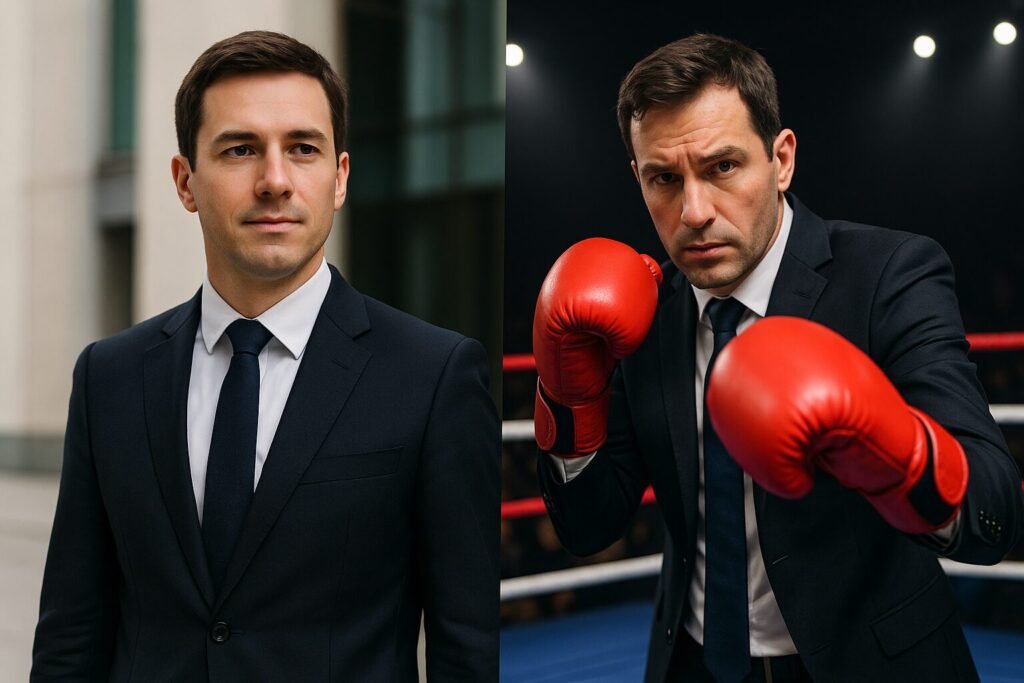White-collar boxing has exploded in recent years. Office workers, accountants, lawyers and even celebrities are lacing up gloves, stepping through the ropes, and going a few rounds under the lights. But here’s the real debate: does this scene actually help the sport grow, or is it watering down what “real” boxing is meant to be?
I’ll be honest with you – I’m actually a fan of white-collar boxing. And I’ll explain why.
Not Pretending To Be Professionals
The first thing to remember about white-collar fighters is that they’re not trying to pass themselves off as pros. Most of them know exactly what they are: amateurs having a go, often for charity or the thrill of testing themselves.
There’s something refreshingly honest about that. You don’t get the smoke and mirrors of influencer boxing, where some lads act like world champions after three rounds. White-collar boxing impact is more grounded – it’s about giving normal people a chance to feel what it’s like under the lights without pretending they’re Canelo or Tyson Fury.
Yes, There Are Risks – But So Are Sunday League Matches
Critics always point to the safety issue. And fair enough – boxing is dangerous. Head injuries and knockouts aren’t a joke. But let’s keep some perspective here.
Every weekend, amateur footballers break ankles in five-a-side leagues, and Sunday League players end up in A&E after reckless tackles. Nobody’s writing think-pieces about banning Sunday League football. So why should boxing be any different, provided there are proper medics and referees in place?
The truth is, the people stepping into white-collar bouts usually take it very seriously. They train hard, they spar, they follow medical checks. In fact, some amateur boxing gyms now run white-collar sessions to make sure fighters are being coached safely and responsibly.
White-Collar Boxing Impact: Growing The Sport
Here’s the part a lot of people don’t talk about. White-collar boxing is actually a gateway.
Plenty of people who’ve had a white-collar fight end up staying in the gym afterwards. Some transition into amateur boxing. Others become lifelong fans of the sport. Even if they never fight again, they leave with a respect for what pros put themselves through every single day.
And from a grassroots point of view, the white-collar boxing impact can be huge. Local gyms get more members, small shows get more buzz, and money is often raised for charity. That’s not a bad trade-off.
Does It Blur The Lines Of Legitimacy?
Of course, there’s a fair question: does all this dilute the sport? Are we cheapening boxing’s reputation by giving the spotlight to people who’ve never fought before?
Personally, I don’t think so. The true damage to boxing’s image comes from dodgy judging, too many belts, and promoters protecting fighters. White-collar boxing might not produce world champions, but it does get people through the doors of gyms, watching fights, and caring about the sport.
If anything, that’s the kind of grassroots energy boxing desperately needs right now.
Final Bell
White-collar boxing isn’t perfect, and it never will be. But when I weigh it up, the benefits outweigh the risks. It gives ordinary people a taste of the ring, it keeps gyms busy, it raises money for good causes, and it keeps boxing visible at a time when the sport’s mainstream spotlight can be hit-and-miss.
For me, that’s a net positive. The white-collar boxing impact is real – and it’s here to stay.
What do you think?
Have you ever taken part in a white-collar fight, or do you think it cheapens the sport? Drop your thoughts in the comments, share this with your mates, and head over to CMBoxing for more opinion pieces like this.

